
Willem-Alexander is the King of the Netherlands, having acceded to the throne following his mother's abdication in 2013.

Máxima is the queen of the Netherlands as the spouse of King Willem-Alexander. Argentine by birth, she worked in marketing when she met Willem-Alexander, eldest son and heir apparent of Queen Beatrix, in 1999. They married in 2002, and became king and queen on the abdication of her mother-in-law in 2013. As princess and as queen, Máxima has promoted social integration of immigrants, LGBT rights, and financial inclusion. She and Willem-Alexander have three daughters, Princesses Catharina-Amalia, Alexia, and Ariane, who are first, second, and third, respectively, in the line of succession.

Pieter van Vollenhoven Jr. is the husband of Princess Margriet of the Netherlands and a member, by marriage, of the Dutch Royal House.
The Order of the Crown is a national order of the Kingdom of Belgium. The Order is one of Belgium's highest honors.

The Military William Order, or often named Military Order of William, is the oldest and highest honour of the Kingdom of the Netherlands. It is named after St. William of Gellone (755–814), the first Prince of Orange. Its motto is Voor Moed, Beleid en Trouw. The chivalric order was established on 30 April 1815 by King William I and was presented for feats of excellent bravery on the battlefield and as a meritorious decoration to senior military officers. Comparable with the French Légion d’Honneur but far less often awarded, it is open to everyone regardless of rank or nobility—not only to Dutch military, but also to foreigners. To date, membership in the Order is extremely rarely awarded, and only for exceptional bravery in battle.

The Order of Orange-Nassau is a civil and military Dutch order of chivalry founded on 4 April 1892 by the Queen regent Emma, acting on behalf of her under-age daughter Queen Wilhelmina.
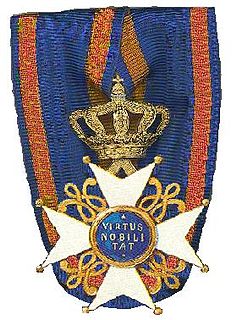
The Order of the Netherlands Lion, also known as the Order of the Lion of the Netherlands is a Dutch order of chivalry founded by King William I of the Netherlands on 29 September 1815.

The Order of the Crown is a house order of the Dutch Royal House. The order came into being as a result of Queen Juliana's reorganization of the Order of the House of Orange in 1969. The 18 classes of the house order were no longer felt to be appropriate in the ever more egalitarian Dutch society of the 1960s. The Order was divided into five subdivisions. As a house order it is not subject to ministerial responsibility or influence, but is awarded at the discretion of the Dutch monarch alone.

The Order of the House of Orange, sometimes referred to as the House Order of Orange, is a dynastic order of the House of Orange-Nassau, the royal family of the Netherlands similar to the Royal Victorian Order in the United Kingdom. The order was instituted by Queen Wilhelmina of the Netherlands on 19 March 1905 and is not subject to ministerial responsibility or influence, but is awarded at the discretion of the Dutch monarch alone.
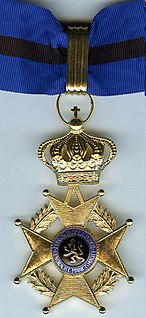
The Order of Leopold II is an order of Belgium and is named in honor of King Leopold II. The decoration was established on 24 August 1900 by Leopold II as Sovereign of the Congo Free State and was in 1908, upon Congo being handed over to Belgium, incorporated into the Belgian awards system. The order is awarded for meritorious service to the sovereign of Belgium, and as a token of his personal goodwill. It can be awarded to both Belgians and foreigners, and is seen as diplomatic gift of merit.
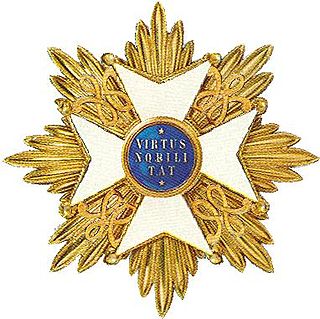
In the Dutch honours system, most orders are the responsibility of ministers of the Netherlands Government. The house orders, however, are awarded at the discretion of the Dutch monarch alone.

The Royal Order of the Lion was established by King Leopold II of Belgium on 9 April 1891, in his capacity as ruler of the Congo Free State, and was awarded for services to the Congo and its ruler that did not deserve the award of the Order of the African Star, and were not necessarily performed from within Belgian Congo.

The Order of the Gold Lion of the House of Nassau is a chivalric order shared by the two branches of the House of Nassau.
The Cross for Courage and Fidelity is a military award that was established by Queen Emma of the Netherlands by Royal Decree on 7 March 1898. The cross replaced the old Medal for Courage and Fidelity, which had limited prestige and status according to the Netherlands government. The cross is the second highest award of the Kingdom of the Netherlands, preceded only by the Military William Order. The cross was awarded to natives of the Netherlands East Indies that showed exceptional display of bravery and fidelity.

Prince Bernhard of Lippe-Biesterfeld was a German-born nobleman who was the consort to Queen Juliana of the Netherlands; they were the parents of four children, including Beatrix, who was Queen of the Netherlands from 1980 to 2013.
The Star for Loyalty and Merit was a civilian award established on 1 January 1894 by Governor-General Carel Herman Aart van der Wijck of the Dutch East Indies. The star replaced the old Medal for Civil Merit, which had limited prestige and status according to the Netherlands government. The star was awarded in gold to "significant and meritorious" natives, and in silver to village chiefs and leaders of the "Eastern foreigner" communities. Dutch (Europeans) were not eligible to receive the star.
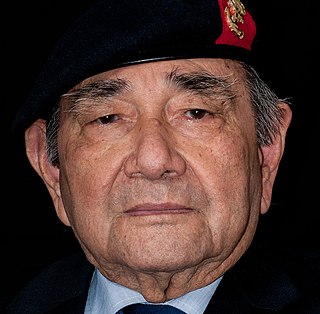
Giovanni Narcissus Hakkenberg was a Dutch marine of Indonesian and European descent, and decorated war hero and knight of the Military Order of William. The Military William Order is the highest honour in the Netherlands, bestowed for "performing excellent acts of Bravery, Leadership and Loyalty in battle".
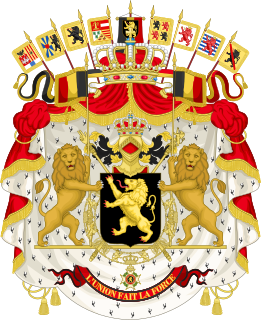
The Royal and Merciful Society of Bearers of Medals and Awards of Belgium was founded in 1865. The headquarters of the Royal Society is located in Heule, Belgium.
















